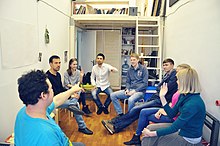 Players making accusations in a game of Mafia | |
| Genres | Social game |
|---|---|
| Related games | |
| Murder mystery game | |
A social deduction game is a game in which players attempt to uncover each other's hidden role or team allegiance.[1] Commonly, these games are played with teams, with one team being considered "good" and another being "bad".[2] During gameplay, players can use logic and deductive reasoning to try to deduce one another's roles, while other players can bluff to keep players from suspecting them.
Examples of social deduction games include Mafia, in which only the mafia know who is mafia and what the mafia players' roles are; Bang!, in which only the sheriff's role is known to everyone; and Secret Hitler, in which only the fascists know who the fascists are, except for the player who plays as Hitler.[3] Other social deduction games include The Resistance, Deception: Murder in Hong Kong and Spyfall.
Social deduction games have been adapted to video games numerous times through mods or full games. One instances of such adaptations are custom maps for StarCraft: Brood War including Changeling and The Thing.[4] These custom maps inspired later Warcraft III custom maps including Mafia, Werewolf, Zerg Infestation, and another Changeling and The Thing.[5] Other notable examples include Garry's Mod "Trouble in Terrorist Town" game mode,[6] Town of Salem, StarCraft II's Phantom Mode mod,[7] and Among Us.
One important element of strategy in some social deduction games is determining how long to stick to one's story in the light of information obtained from other players.[8] A Monte Carlo tree search has been suggested for making decisions in social deduction games.[9]
- ^ Engelstein, Geoffrey; Shalev, Isaac (2020). Building Blocks of Tabletop Game Design: An Encyclopedia of Mechanisms. Boca Raton, FL: Taylor & Francis Group. p. 220. ISBN 978-1-138-36549-0.
- ^ Farber, Matthew (2020). Global Perspectives on Gameful and Playful Teaching and Learning. Hershey, PA: IGI Global. p. 6. ISBN 9781799820154.
- ^ Engel Bromwich, Jonah (5 September 2017). "Secret Hitler, a Game That Simulates Fascism's Rise, Becomes a Hit". The New York Times. Retrieved 27 March 2020.
- ^ "Changeling". July 13, 2014. Retrieved April 9, 2022.
- ^ LazyCoder (January 15, 2011). "The Thing". Epicwar.com.
- ^ "What is Trouble in Terrorist Town?". Trouble in Terrorist Town. Retrieved 25 August 2020.
- ^ "StarCraft II Arcade Series: Phantom Mode". 27 January 2016. Retrieved 25 August 2020.
- ^ Eger, Markus; Martens, Chris (2018-09-25). "Keeping the Story Straight: A Comparison of Commitment Strategies for a Social Deduction Game". Proceedings of the AAAI Conference on Artificial Intelligence and Interactive Digital Entertainment. 14: 24–30. doi:10.1609/aiide.v14i1.13015. S2CID 53232291.
- ^ Cowling, Peter I.; Whitehouse, Daniel; Powley, Edward J. (2015-08-02). "Emergent bluffing and inference with Monte Carlo Tree Search". 2015 IEEE Conference on Computational Intelligence and Games (CIG). pp. 114–121. doi:10.1109/CIG.2015.7317927. ISBN 978-1-4799-8622-4. S2CID 15461414.